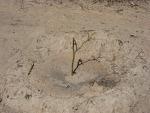I never met the great Metropolitan Anthony of Sourozh, but I did go to his funeral in 2003. I had just been ordained as a bishop (of Croydon) in May and he died on 4 August. I was asked to attend his funeral, probably because I was one of the few bishops available in London and not on holiday somewhere remote. It was a very long service on a very hot day, but I learned a lot and it was an honor to be there.
I had read some of Metropolitan Anthony’s writings, especially on prayer. I don’t have a great for epic quotes – and quickly forget what some books have to say, even when I have only just finished them – but, the line I never forgot was this:
To pluck a flower means to take possession of it, and it also means to kill it…
This is the sort of paradox that runs through real life and makes everything we do somehow ambiguous. I can’t look at flower arrangements now without thinking of this (and hay fever).
 In these strange days of lockdown and questioning, it might just offer some encouragement to those who struggle with the feeling of helplessness. When we are used to endless activity, maybe confusing this with virtue, it is easy to ask what value I have to offer when I can’t do what I normally do. For clergy this can be particularly challenging – needing to let old patterns of pastoral care and teaching die (for a time?) before we can orientate towards creating something new that is untested and feels less incarnational, perhaps.
In these strange days of lockdown and questioning, it might just offer some encouragement to those who struggle with the feeling of helplessness. When we are used to endless activity, maybe confusing this with virtue, it is easy to ask what value I have to offer when I can’t do what I normally do. For clergy this can be particularly challenging – needing to let old patterns of pastoral care and teaching die (for a time?) before we can orientate towards creating something new that is untested and feels less incarnational, perhaps.
Plucking a flower kills the flower, cutting off its lifeblood and turning into a possession for my limited and temporary pleasure. It has become a utility rather than a living thing. And we are taught that commodifying living things is not something of which to be proud – especially when it involves killing them. But, we still do it. And one could argue that we cannot live without doing it. Even beauty cannot be cost-free.
This illustrates the messiness of the world and what it means to live in it. The biblical narrative tells us that God is no stranger to this sort of paradox. Not only are the Psalms riddled with expressions of bewilderment, exuberance and lament at the difficulty of all this, but the Jesus bit is all about God opting into the whole business of living with contradiction and not exempting himself from it.
Sometimes we just have to learn to live with it. To stop trying to resolve every conundrum. To be patient with those who are slower to fix or accommodate to it. To recognize the call to humility that (to mix my metaphors) swimming in this mortal pool inevitably provokes.
No wonder, as the apostle Paul acknowledged, that “the whole creation groans in anticipation” of the fulfilment of all things while the ‘not yet’ persists.
